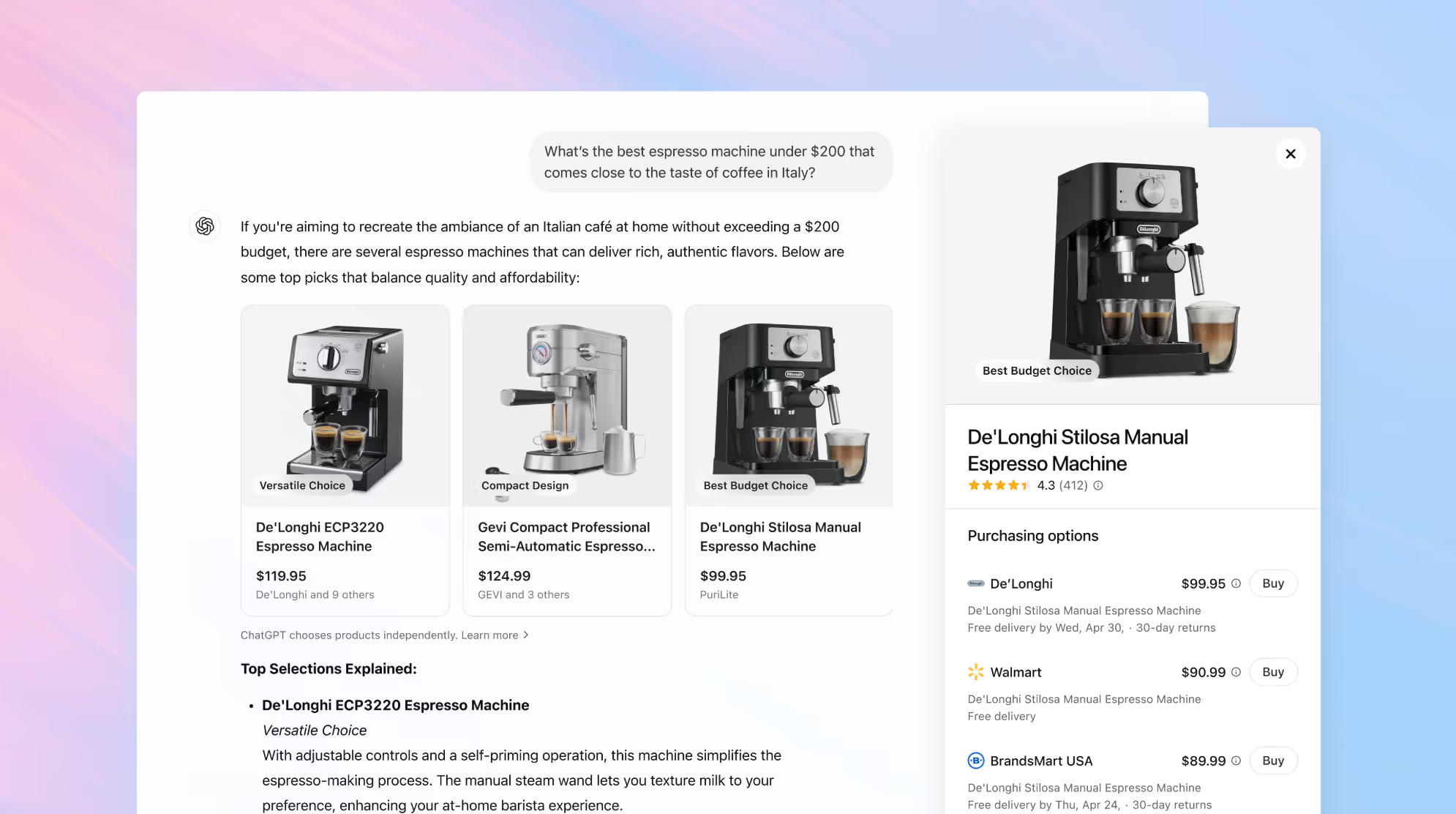
OpenAI integrates shopping into ChatGPT: a new paradigm for product research
OpenAI turns ChatGPT into an intelligent shopping assistant that can provide personalized product recommendations in natural language. This evolution, which is still in the initial phase, is part of a larger movement: the automation of the purchasing process through generative artificial intelligence.
The impact of this feature goes beyond technology. It goes to the heart of Google's business model and shakes up the fundamentals of online product research. For retailers, the challenge is no longer just to position themselves on sponsored queries, but to make their products legible, understandable and recommended in a conversational environment.
An organic recommendation logic, without an advertising model
Unlike Google Shopping, which operates on the principle of auctions and sponsored visibility, ChatGPT offers an approach based on contextual relevance. The user formulates a complex request (“running shoes for mixed terrain with good support”), and the AI generates a synthetic response composed of:
- a selection of products,
- visuals and price information,
- a summary of customer reviews from third party sources (Reddit, Amazon, Best Buy...),
- links to commercial sites to finalize the purchase.
OpenAI does not (yet) monetize this feature through sponsored posting. The model is based on the quality of the signals produced available online and their ability to feed the algorithmic response.
A questioning of transactional search as designed by Google
Google has historically dominated transactional search thanks to the power of its advertising model, based on intentional targeting. But ChatGPT introduces a break in logic: the user no longer explores, he consults an assistant. The interface logic is transformed:
- The User journey is shorter, less fragmented, less clickable.
- La prioritization of results is based on understanding the need, not on the ability to pay.
- La added value is based on synthesis and contextualization, rather than on the granularity of the filters.
For Google, this poses a structural threat. If part of the purchase intent falls into conversational environments, advertising models that rely on pure search may lose influence.
For retailers, a new requirement for product readability
To date, the vast majority of brands have no leverage to influence their presence in the responses generated by ChatGPT. However, there are several signals that determine the probability of appearing in a recommendation:
- the wealth of product descriptions,
- the presence of explicit attributes (materials, use, compatibility, style...),
- the availability of reliable and contextualized opinions,
- the accessibility of data via indexable sources.
In other words, the quality of product flows, landing pages and related content is becoming a central factor in the AI recommendation economy. A logic that we already discussed in this article on key attributes in Google Merchant Center
A mutation consistent with the evolution of post-click
This transformation of e-commerce research is part of a wider dynamic: that of the empowerment of the user journey, in an environment where AI anticipates the need and structures the information.
Therefore, the challenge is no longer just to capture the audience, but to create readable, actionable, and conversion-oriented product environments. The role of landing pages, recommendation modules, and data structuring is becoming increasingly important. This echoes work carried out on post-click, as shown in this analysis on the personalization of landing pages.
Medium-term outlook
OpenAI has not yet formalized its monetization strategy. It is likely that she is exploring affiliate models, partnerships with commerce platforms, or APIs for aggregators. But regardless of the model chosen, the fundamentals change:
- visibility is no longer purchased but Deserved,
- the product data becomes again powerhouse,
- the user experience is based on the ability to structure and enrich its contents.
This mutation does not mark the end of Google Shopping, but calls on brands to prepare for the coexistence of several search ecosystems, with differentiated but complementary logics.
👉 Also read:
- How well-filled attributes boost your Shopping campaigns
- Google Merchant Center: 5 mistakes to avoid
- GEO (Generative Engine Optimization): The complete guide to optimizing your presence in AI results in 2025
*****
The integration of shopping into ChatGPT marks a new step in the decentralization of product research. As chatbots become intermediaries between intent and transaction, performance no longer depends solely on media buying or traditional algorithmic positioning.
For e-commerce players, this means a redefinition of priorities: structuring flows, quality of attributes, post-click efficiency, useful content. Conversational SEO is shaping up to be the next frontier in product visibility.
Continue reading

What Google says to be ready for agentic commerce: attributes, guidelines and checklist Google Merchant Center

Top 10 Global Marketplaces 2025 — A complete overview of global e-commerce

ChatGPT Ads: How Conversational Advertising Is Changing the Rules of Digital Marketing
.svg)







